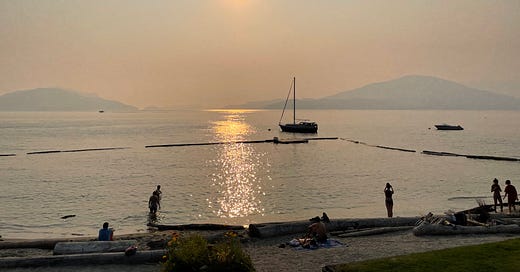The Economic Reset
Inflation, energy and higher rates are putting pressure on the public and politicians
An incredibly long summer where it felt we could put all our worries away and ignore all the dark clouds has come to an end. Rain and colder weather moved in and at the same time the economic realities are beginning to sink in, globally. The Truss experiment in the UK is a reminder of how deep an economic hole most of the western world has dug itself into.
What most governments and central banks have done through Covid - where lockdowns created an economic correction - was open the monetary floodgates through both low interest rates and excessive spending. That would keep things going. The unsurprising result was a return of inflation across most economies, exacerbated by the Covid-affected supply lines and the now eight month old war in Ukraine. We experienced it in tech where the money supply seemed endless, valuations set record highs and stock markets kept climbing. All of this when most of us sat comfortably at home behind our screens. It almost made no sense and as we are finding out now, it didn’t. The party had to end.
Also, no one believed that sharp interest rate increases would return as it would sink debt-heavy economies and instantly put many mortgage holders under water. No one was going to entertain that idea; it would be political and economic suicide and we would probably at worst experience a soft landing. There was some sort of an implicit understanding: governments and central banks could ill afford to pop the bubble. But as inflation started to tear into the lives of all of us, it became clear action was required. The only way out of an inflationary spiral is to keep increasing interest rates while everyone - governments and consumers - reel in spending. It will take the pressure off prices and allows everyone to address the increased cost of living and build up some capital. That is what is happening right now, the dynamic however is impacted by rising energy prices and, as I am hearing, continued supply issues globally. Worse: the fabric of unstoppable economic growth with open borders and warm relations with in particular China is over. The economy is tanking, but so is our global order. So how do governments and consumers deal with this?
The Truss government’s attempt to fire up the economy with tax cuts that would bring ‘growth’ has failed and other politicians have taken notice. With debt piling on there is no more room for further tax breaks and the idea that we can ‘kick-start growth’ and get back to what the world got used to in the last thirty years is over. What little extra spending room governments have will now need to be used to help the most affected with tax rebates and energy price compensation schemes. The evidence of closing shops and the elderly being crushed by rising energy bills in particular in Europe is mounting. It will require a very difficult sort of political leadership than what we have become used to. Trudeau’s reckless spending (started well before Covid), Trump’s priming the pump and of course the insanity of the Truss growth plans can be relegated to the dustbin of economic history. The area of dull and probably unpopular bookkeepers is coming at us, the men and women that will nickel and dime us back to a new economic equilibrium. Britain got the leader to do that just now. At the same time these leaders will need some strong moral fibre, high energy prices do not mean we need to be cutting deals with energy rich bad actors, like for instance Putin.
If it puts pressure on politicians then it is not hard to see where it leaves the general public. Higher interest rates, higher cost of goods and wildly fluctuating energy bills put a rising level of uncertainty on all of us. The average citizen does not have much of a choice and will have to start making cutbacks. That may be hard, but on the other hand we have come to live in a world of extreme luxury and utterly unnecessary stuff that it may not be such a bad idea, financially and mentally, to start going back to basics. While I have had the benefit of the 1970s and 1980s where not everything was a given, we now have a generation that has never known any real economic setbacks. Layer multiple armed conflicts and a realignment of world power over this and it becomes clear that things will be challenging and uncertain moving forward.
Yet in all that uncertainty lies opportunity. Not just for ourselves in re-ordering and re-planning our lives, but also for politicians to step up and create a real vision. No more time for rank vote buying or cheap populism, now is a time for leaders that can take the uncharted path and making it clear that experiencing hardship is actually real growth. If we accept that and do our part, then we may come out of this downturn and see each other at the beach again next summer.




I was at the Professional Pricing Society conference in San Francisco last week. I led a workshop on how to better integrate pricing and innovation, and Adobe had a great workshop on pricing and business model innovation, but ... most of the talk was about recession, how to prepare, how severe it could be. I wouldn't say doom and gloom, but there was definitely a lot of fear and a 'batten down the hatches' mentality.